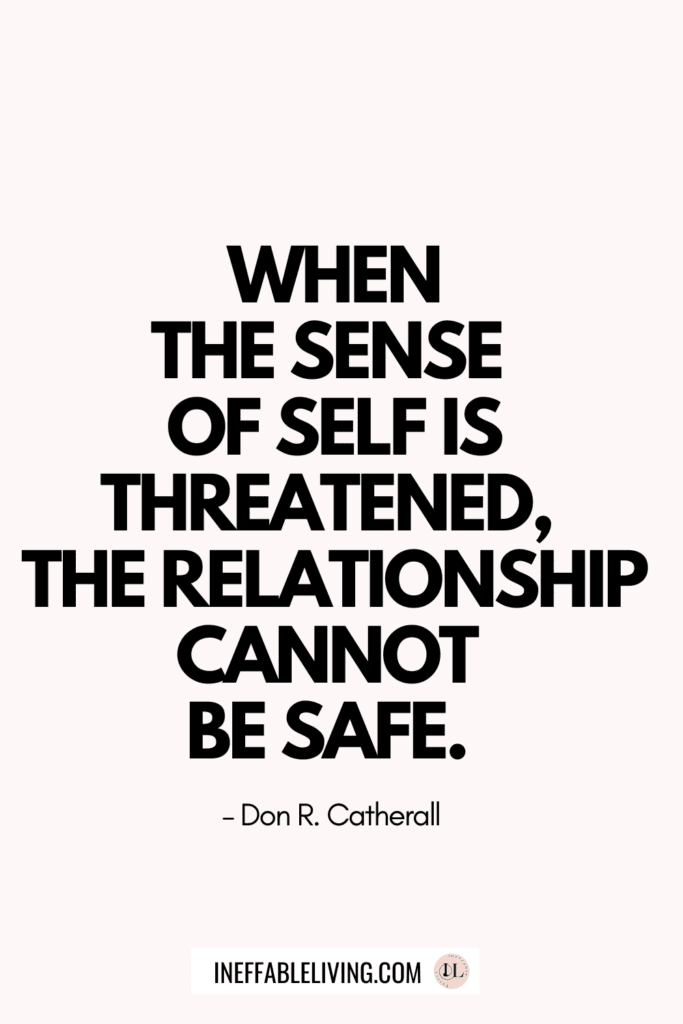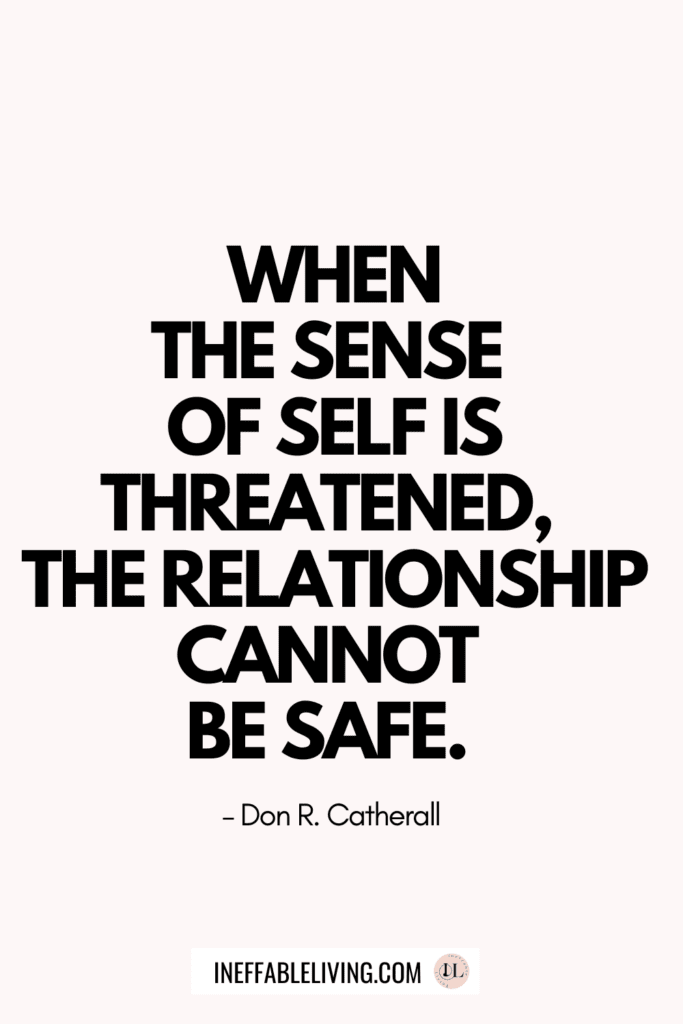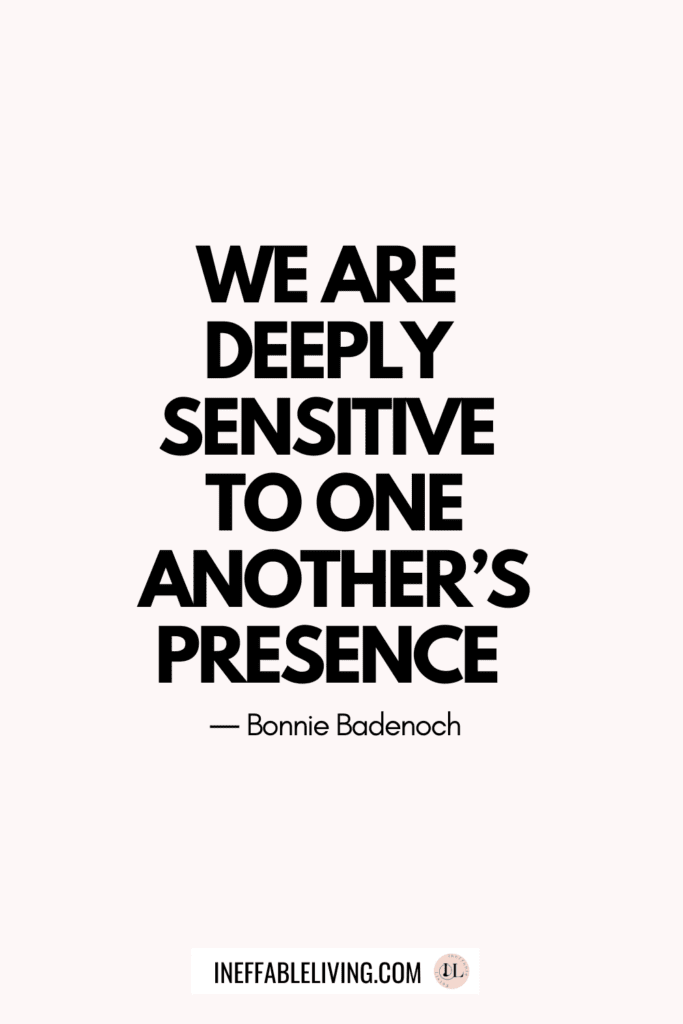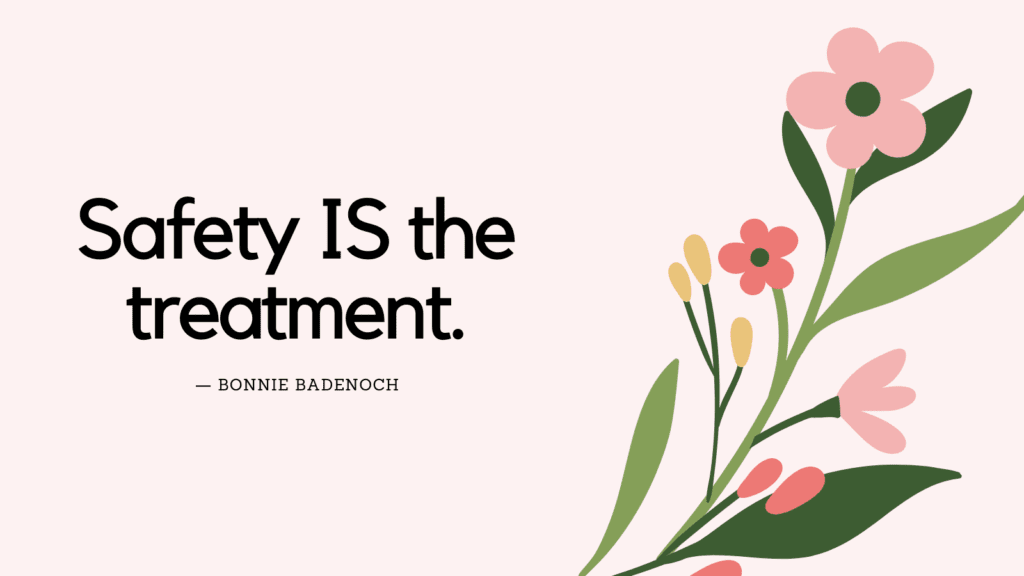This post contains some of the best emotional safety quotes.
Emotional Safety Quotes
1. “Safety IS the treatment.” ― Bonnie Badenoch
2. “When we neuroceive safety, we humans automatically begin to open into vulnerability, and the movement of our “inherent treatment plan” (Sills, 2010) has a greater probability of coming forward. ― Bonnie Badenoch
3. “lack of agenda is the primary essence of safety, giving our people implicit permission to bring forward any aspect of themselves that needs attention.” ― Bonnie Badenoch
4. “With visible relaxation in her body and strong eye contact, she said, “All my life people have criticized me for being cautious. It means a lot that you like that I’m that way.”― Bonnie Badenoch
5. “We are deeply sensitive to one another’s presence” ― Bonnie Badenoch
6. “This feeling of not being emotionally safe showed itself in the two common forms that plague couples who have this problem: either (a) a heightened state of reactivity that results in repetitive, unresolved conflict, or (b) an ongoing state of disconnection that results in a superficial, unsatisfying relationship. Most couples with this problem fall into one of these two categories or a mixture of both.” – Don R. Catherall
Related: Affection Quiz (+3 Strategies To Increase Affection In Your Relationship)

7. “Beneath the surface with these couples, each partner has an underlying feeling that he (or she) is not emotionally safe, that the couple is never far from something happening that will result in harm—either to the individuals or to the relationship.” – Don R. Catherall
8. “Some partners deal with this feeling of unsafety by withdrawing and revealing only part of themselves. Some deal with it by leaping to their defense at the least appearance of what they perceive to be a threat. Some become emotionally numb and stile the passion out of their lives.” – Don R. Catherall
9. “Once a couple becomes locked into a repetitive cycle, whether of conflict or distance, neither partner feels safe enough to be completely open and vulnerable in the relationship. They have lost the key element that makes intimate relationships work—emotional safety.” – Don R. Catherall
10. “It is much safer and easier for her to talk with him about how upset she is when the source of her upset feelings is someone or something other than him.” – Don R. Catherall
11. “Their focus is always on the behavior of shaming, which is certainly a central part of the problem, but helping couples to heal and create emotional safety requires much more than just putting a halt to shaming.” – Don R. Catherall
12. “…when the sense of self is threatened, the relationship cannot be safe.” – Don R. Catherall
13. “..feelings of shame or distress, or the perception of disapproval or distrust in the other partner, eventually tend to lead to a loss of emotional safety.” – Don R. Catherall
Related: Fear Of Intimacy Quiz (+13 Tips On How To Increase Emotional Intimacy In A Relationship?)

14. “Partners are largely unable to achieve satisfying levels of intimacy when the relationship does not feel safe.” – Don R. Catherall
15. “Emotional safety refers to those times in a relationship when both partners are (relatively) free of negative affects in the realms of esteem and attachment.” – Don R. Catherall
16. “Emotional safety describes a type of relationship, a location on the terrain of the emotional relationship, and a time in a relationship.” – Don R. Catherall

17. “People with a history of unsafe relationships often have a very low threshold of sensitivity to negative affective tone in their partner’s voice, posture, or facial display. Any inkling of negative tone can then trigger their anxiety. He may grimace when he bumps his toe and she wants to know if he is upset with her.” – Don R. Catherall
18. “…it is shame that plays the primary role in disrupting emotional safety in intimate relationships.” – Don R. Catherall
Related: Best 21 Couples Journal Prompts To deepen Your Intimacy
19. “It is important to note that the most powerful experiences of shame occur when people are in the safe zone. When partners think they are safe and have relaxed their defenses, the sudden experience of shame can be devastating.” – Don R. Catherall
20. “When an intimate relationship is moved out of the safe zone, one or both partners experience some level of threat in the realm of attachment, the realm of esteem, or both.” – Don R. Catherall
21. “The longer the relationship remains outside the safe zone, the greater the likelihood that flexibility will decline, maladaptive patterns will be established, and each partner will adopt a more rigid view of both self and other.” – Don R. Catherall
22. “Couples caught up in mutual blaming are difficult to treat because it is not safe for either partner to be vulnerable.” – Don R. Catherall

23. “When a partner does not feel safe, he often will put up a wall instead of a boundary. When he puts up a wall, he is no longer simply distancing. A wall allows nothing to cross; it appears in relationships in which one person cannot deal with the other.” – Don R. Catherall
24. “Appropriate boundaries are a central component of what keeps relationships safe and prevents couples from becoming fused.” – Don R. Catherall
25. “When a couple’s safe zone grows, they find more opportunities for connection, because each partner can be more open and vulnerable.” – Don R. Catherall
Related: Top 7 Tips On How To Create A Conscious Relationship Using ACT
FREE Printable Relationship Worksheets (PDF)
How to Cultivate Emotional Safety In Your Relationship?
Emotional safety is the foundation of a healthy, thriving relationship. It allows both partners to feel valued, understood, and secure. Here’s how to create an environment where both you and your partner can express yourselves openly and authentically.
1. Practice Active Listening
When your partner speaks, give them your full attention. Maintain eye contact, avoid interrupting, and reflect on what they’re saying to show you understand. Phrases like “I hear you” or “That makes sense” validate their feelings and build trust.
2. Show Empathy
Put yourself in your partner’s shoes and try to feel what they might be experiencing. Respond with kindness and understanding, even if you don’t fully agree. Empathy strengthens the emotional bond by showing you care about their inner world.
3. Communicate Honestly and Kindly
Honest communication is key to emotional safety, but it should also be kind. Express your thoughts and feelings without blame or criticism. Use “I” statements like, “I feel hurt when…” rather than “You always…” to foster constructive conversations.
4. Create a Judgment-Free Zone
Let your partner know they can share their feelings without fear of ridicule or judgment. Practice acceptance, even when what they share is hard to hear. Reassure them with phrases like, “It’s okay to feel this way,” or “I’m here for you.”
5. Validate Their Feelings
Even if you don’t understand or agree with your partner’s perspective, acknowledge their emotions as valid. For example, you can say, “I can see why that upset you,” instead of dismissing their feelings with, “That’s not a big deal.”
6. Apologize and Forgive
Mistakes happen in every relationship. When you hurt your partner, apologize sincerely without justifying your actions. Similarly, practice forgiveness when they make mistakes. Holding grudges erodes emotional safety over time.
7. Respect Boundaries
Everyone has emotional limits, and respecting your partner’s boundaries shows that you value their needs. If they need space during a heated moment, honor that and revisit the conversation when both of you are ready.
8. Be Reliable
Consistency builds trust. Follow through on promises, show up when you say you will, and be dependable. Reliability creates a sense of stability that fosters emotional safety.
9. Share Vulnerabilities
Lead by example in creating emotional safety by being open about your own feelings and experiences. Sharing your vulnerabilities encourages your partner to do the same, deepening your connection.
10. Avoid Criticism and Defensiveness
Criticism and defensiveness can quickly erode emotional safety. Focus on the issue at hand rather than attacking your partner’s character. Replace accusations with solutions-oriented language, and stay open to feedback without getting defensive.
11. Build Trust Over Time
Emotional safety grows with trust. Be honest, reliable, and consistent in your actions. Trust also involves giving your partner the benefit of the doubt and avoiding unnecessary suspicion.
12. Encourage Growth
Support your partner’s goals, dreams, and personal growth. Celebrate their successes and offer encouragement during challenges. Emotional safety thrives when both partners feel seen and supported in their individual journeys.
13. Address Conflict Calmly
Conflicts are inevitable, but how you handle them matters. Stay calm, avoid raising your voice, and focus on finding solutions rather than “winning.” Reassure your partner that disagreements don’t threaten the stability of your relationship.
14. Express Appreciation Regularly
Make a habit of expressing gratitude for your partner’s efforts, qualities, and presence in your life. Simple gestures like saying, “Thank you for being patient,” or “I love how you always make me laugh,” reinforce emotional safety.
15. Be Patient
Cultivating emotional safety takes time and consistent effort. Progress may be slow, especially if past experiences have created barriers to trust. Stay committed to building a secure and loving environment.
Final Thoughts
Emotional safety is not something that happens overnight—it’s cultivated through small, intentional actions every day. By practicing empathy, communication, and trust, you can create a relationship where both you and your partner feel safe, valued, and loved.



